MENU
(by Ralph Kurtenbach and Harold Goerzen, Jan. 5, 2018) A crisis is to some people a stumbling block; to others it’s a building block. Stan Houghton showed himself to be of the latter group, becoming better through testing and trial. His 91 years in three different countries are highlighted by a 40-year career in evangelical missions.
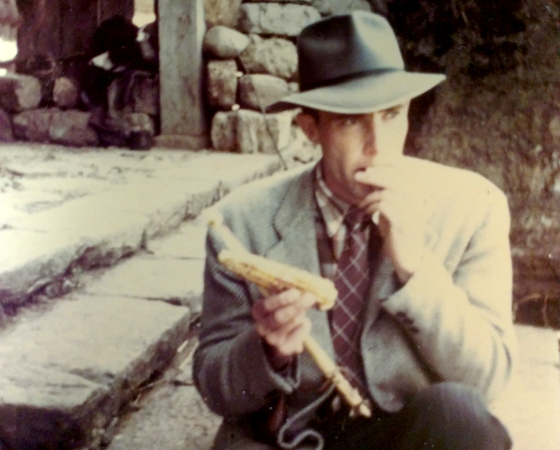 He was born to a U.S. Navy sailor and a professional pianist on Aug. 7, 1926, near a shipyard in Bremerton, Wash. His happy childhood of baseball pitching, piano practice and chemistry projects took a turn for the worse when Stan’s parents said they would divorce. Upset and disheartened, Houghton took to knitting to calm himself. Soon he had made himself a sweater.
He was born to a U.S. Navy sailor and a professional pianist on Aug. 7, 1926, near a shipyard in Bremerton, Wash. His happy childhood of baseball pitching, piano practice and chemistry projects took a turn for the worse when Stan’s parents said they would divorce. Upset and disheartened, Houghton took to knitting to calm himself. Soon he had made himself a sweater.
Bolstered by prayers for his adjustment, 15-year-old Stan soon forged a friendship that changed the course of his life. Hearing from a new friend about Prairie High School (now called Prairie Christian Academy), an outreach of Prairie Bible Institute (PBI) in Three Hills, Alberta, Canada, and gaining parental approval to go, Stan was soon attending classes at the school. He was studious and enterprising in the dormitory, graduating from both the three-year high school and four-year Bible school.
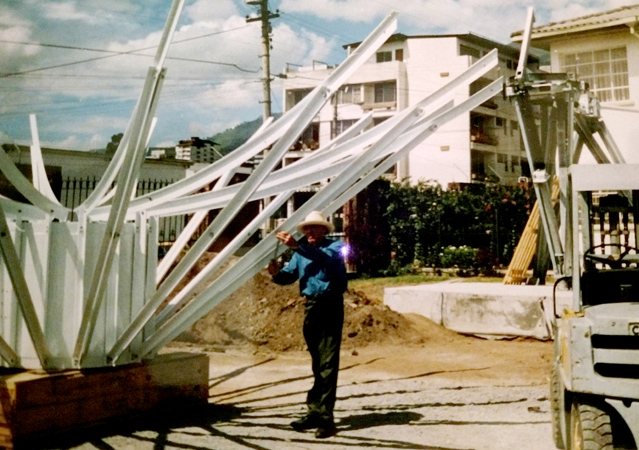 “He bought a metal washtub so he could have hot baths in the winter,” his daughters, Lois and Becky, later wrote of him. “His boarding school friends wanted hot baths too, so he let them take turns renting his wash tub.”
“He bought a metal washtub so he could have hot baths in the winter,” his daughters, Lois and Becky, later wrote of him. “His boarding school friends wanted hot baths too, so he let them take turns renting his wash tub.”
It was also during those years at Prairie that Houghton felt called of God to do mission work—the “need of those who have never heard of Jesus Christ” pressed upon his heart. “At a missionary conference in 1941,” Houghton recalled, “I knew I was to be a missionary.”
He also told of tight finances. Short of money for a Wycliffe Bible Translators-sponsored linguistics summer course, Stan watched a 1933 Dodge come into his hands, and he credits God’s provision of the broken-down vehicle. “With $5 in parts,” Houghton related. “I fixed the car and sold it for enough money to go. I was always good with my hands.”
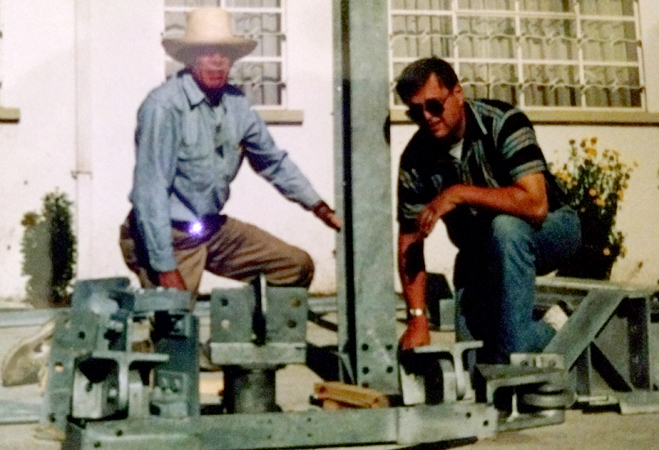 Arriving in Ecuador as a single missionary in 1949, he learned Spanish, the first of two languages needed for the work. Then he learned Quichua from Julia Woodward, a missionary pioneer with Avant (formerly Gospel Missionary Union) who served in Ecuador for more than 50 years.
Arriving in Ecuador as a single missionary in 1949, he learned Spanish, the first of two languages needed for the work. Then he learned Quichua from Julia Woodward, a missionary pioneer with Avant (formerly Gospel Missionary Union) who served in Ecuador for more than 50 years.
It was around this time that Stan met Marian Loewen, a single missionary from Steinbach, Manitoba, Canada. “She caught my attention because she was not only good looking, but she wore a red sweater which was unusual in those days,” Houghton recalled. “I had always prayed that I would marry the first person I fell in love with. The Lord answered that prayer with Marian.” They married on May 18, 1952, in Shell, at the edge of the Ecuadorian rain forest.
The Houghtons ministered among the Quichua-speaking people of Chimborazo province before and during a burgeoning of the evangelical church in Ecuador. “I consider it the greatest experience of watching God’s Spirit at work in a people movement,” Marian said.
With these fulfilling ministry years, there also came hardship and heartache in the deaths of two of their six children due to respiratory problems. The cold climate of the Andean highlands predisposes children to coughs and even pneumonia.
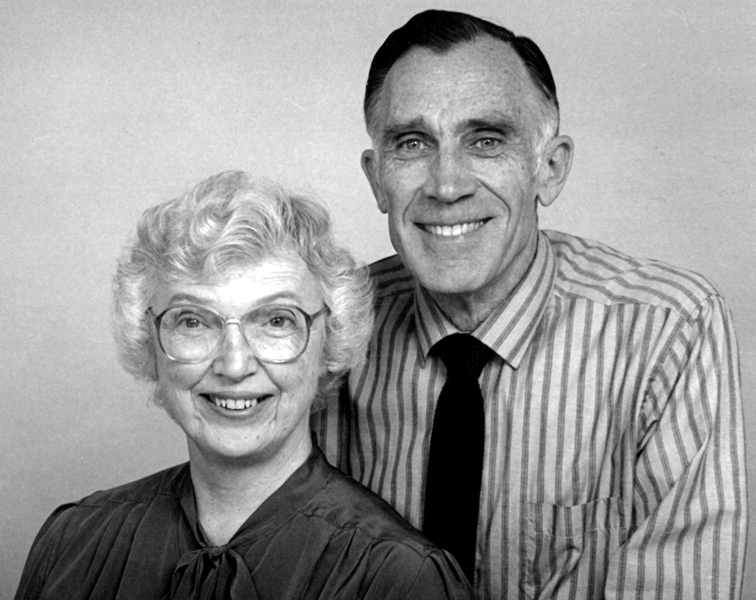 “We have two babies buried in Colta,” Marian later recounted. “Losing our last one was a very victorious spiritual experience.” Through this hardship, Stan and Marian were better able to identify with the area’s indigenous people who had also suffered loss. Then, as daughters Lois and Becky tell, “They dried their tears and got back to work, spreading the story of Jesus.”
“We have two babies buried in Colta,” Marian later recounted. “Losing our last one was a very victorious spiritual experience.” Through this hardship, Stan and Marian were better able to identify with the area’s indigenous people who had also suffered loss. Then, as daughters Lois and Becky tell, “They dried their tears and got back to work, spreading the story of Jesus.”
While serving with Avant, Stan’s responsibilities included general missionary work as well as building and maintenance. In his area’s environment of religious intolerance at the time, it was another crisis that turned his capable hands to radio broadcasting.
“I got into radio because a friend of mine—a missionary doctor—was beaten up by Indians and nearly died,” Houghton recounted decades later. “There has to be a better way to reach these people.”
Missionary physician Donald Dilworth—possibly the doctor referred to—had established a mission clinic, Allicai Huasi, in Colta. In 1960 he proposed to supporting churches the idea of Christian broadcasting. La Voz de AIIECH (Asociación de Iglesias Indígenas Evangélicas de Chimborazo) began broadcasting on Dec. 6, 1961. Almost immediately, the station was shown to be an effective communications instrument among the Quichua-speaking people.
 In the early years of operation, 70 fixed-tuned radios were sold in 13 Quichua communities, garnering great interest. It was not uncommon to see 20 to 30 people gathered around to listen to a single radio. From 1962 to 1977 Houghton maintained the Colta station and another Quichua-language broadcast outlet at Latacunga. He found training the national Christian workers to operate the stations to be gratifying. Both stations continue operating today.
In the early years of operation, 70 fixed-tuned radios were sold in 13 Quichua communities, garnering great interest. It was not uncommon to see 20 to 30 people gathered around to listen to a single radio. From 1962 to 1977 Houghton maintained the Colta station and another Quichua-language broadcast outlet at Latacunga. He found training the national Christian workers to operate the stations to be gratifying. Both stations continue operating today.
After 29 years of mission work, the Houghtons returned to North America as Stan “wanted to obey God by honoring his parents, so said goodbye to their friends and the work they loved in Ecuador,” according to his daughters. In Washington, Stan worked as a copy machine repairman.
Later accepted for mission work with Reach Beyond, the Houghtons returned to Ecuador in 1985. Stan was assigned technical jobs in broadcasting; Marian helped in the English Language Service of HCJB, the Voice of the Andes.
“The Lord has given me a great talent in building and repair,” Stan said. “I know He wants me to use this talent for Him. No, it’s not glamourous, but it needs to be done. If it weren’t for technical people, the gospel broadcasts would soon fall silent.” At their Ecuadorian church, Stan sometimes preached, and on occasion, played piano.
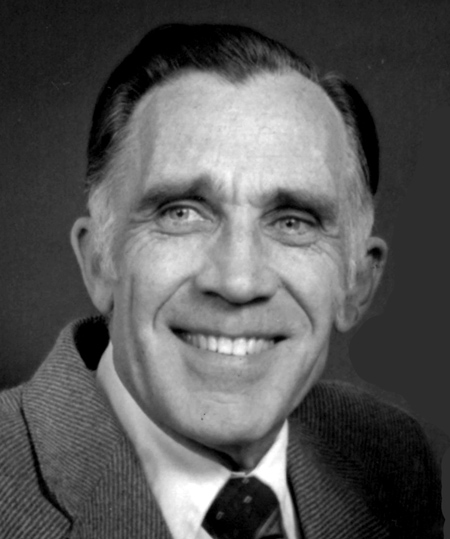 “Stan was an excellent and trustworthy mountain climber during his time in Ecuador, and continued as a regular hiker after they returned to the U.S. after retirement,” added Reach Beyond retiree Roger Stubbe, whose responsibilities included serving as director of broadcasting. “Even though he had polio as a child, permanently weakening one of his legs, keeping up with him in the Ecuadorean Andes was more than I could handle at times.”
“Stan was an excellent and trustworthy mountain climber during his time in Ecuador, and continued as a regular hiker after they returned to the U.S. after retirement,” added Reach Beyond retiree Roger Stubbe, whose responsibilities included serving as director of broadcasting. “Even though he had polio as a child, permanently weakening one of his legs, keeping up with him in the Ecuadorean Andes was more than I could handle at times.”
In Houghton’s latter years in Silverdale, Wash., he was treated for cancer and suffered from Hodgkin’s disease. On Dec. 30, 2017, he died in his sleep. He was predeceased by three children, Barbie and David (who died in infancy) and a son, John “Jack” Stanley Houghton. He is survived by his wife of 65 years, Marian. Other survivors include their children, Lois (Robert) Rienstra, Laurence (Michele) and Becky (Mike ) Leenstra, along with 14 grandchildren and 14 great-grandchildren.
The family has asked that memorial gifts go to the Quichua broadcasts at Radio HCJB in Quito. The following link should be used: http://newhorizonsfoundation.com/index.php?option=com_crowdfunding&view=details&id=1567:hcjb-ecuador&catid=8:operating-projects&Itemid=105. An email message should also be sent. The address is [email protected]. Donors should state how much was donated and include a designation for Kichwa broadcasts.
Source: Reach Beyond
 He was born to a U.S. Navy sailor and a professional pianist on Aug. 7, 1926, near a shipyard in Bremerton, Wash. His happy childhood of baseball pitching, piano practice and chemistry projects took a turn for the worse when Stan’s parents said they would divorce. Upset and disheartened, Houghton took to knitting to calm himself. Soon he had made himself a sweater.
He was born to a U.S. Navy sailor and a professional pianist on Aug. 7, 1926, near a shipyard in Bremerton, Wash. His happy childhood of baseball pitching, piano practice and chemistry projects took a turn for the worse when Stan’s parents said they would divorce. Upset and disheartened, Houghton took to knitting to calm himself. Soon he had made himself a sweater.Bolstered by prayers for his adjustment, 15-year-old Stan soon forged a friendship that changed the course of his life. Hearing from a new friend about Prairie High School (now called Prairie Christian Academy), an outreach of Prairie Bible Institute (PBI) in Three Hills, Alberta, Canada, and gaining parental approval to go, Stan was soon attending classes at the school. He was studious and enterprising in the dormitory, graduating from both the three-year high school and four-year Bible school.
 “He bought a metal washtub so he could have hot baths in the winter,” his daughters, Lois and Becky, later wrote of him. “His boarding school friends wanted hot baths too, so he let them take turns renting his wash tub.”
“He bought a metal washtub so he could have hot baths in the winter,” his daughters, Lois and Becky, later wrote of him. “His boarding school friends wanted hot baths too, so he let them take turns renting his wash tub.”It was also during those years at Prairie that Houghton felt called of God to do mission work—the “need of those who have never heard of Jesus Christ” pressed upon his heart. “At a missionary conference in 1941,” Houghton recalled, “I knew I was to be a missionary.”
He also told of tight finances. Short of money for a Wycliffe Bible Translators-sponsored linguistics summer course, Stan watched a 1933 Dodge come into his hands, and he credits God’s provision of the broken-down vehicle. “With $5 in parts,” Houghton related. “I fixed the car and sold it for enough money to go. I was always good with my hands.”
 Arriving in Ecuador as a single missionary in 1949, he learned Spanish, the first of two languages needed for the work. Then he learned Quichua from Julia Woodward, a missionary pioneer with Avant (formerly Gospel Missionary Union) who served in Ecuador for more than 50 years.
Arriving in Ecuador as a single missionary in 1949, he learned Spanish, the first of two languages needed for the work. Then he learned Quichua from Julia Woodward, a missionary pioneer with Avant (formerly Gospel Missionary Union) who served in Ecuador for more than 50 years.It was around this time that Stan met Marian Loewen, a single missionary from Steinbach, Manitoba, Canada. “She caught my attention because she was not only good looking, but she wore a red sweater which was unusual in those days,” Houghton recalled. “I had always prayed that I would marry the first person I fell in love with. The Lord answered that prayer with Marian.” They married on May 18, 1952, in Shell, at the edge of the Ecuadorian rain forest.
The Houghtons ministered among the Quichua-speaking people of Chimborazo province before and during a burgeoning of the evangelical church in Ecuador. “I consider it the greatest experience of watching God’s Spirit at work in a people movement,” Marian said.
With these fulfilling ministry years, there also came hardship and heartache in the deaths of two of their six children due to respiratory problems. The cold climate of the Andean highlands predisposes children to coughs and even pneumonia.
 “We have two babies buried in Colta,” Marian later recounted. “Losing our last one was a very victorious spiritual experience.” Through this hardship, Stan and Marian were better able to identify with the area’s indigenous people who had also suffered loss. Then, as daughters Lois and Becky tell, “They dried their tears and got back to work, spreading the story of Jesus.”
“We have two babies buried in Colta,” Marian later recounted. “Losing our last one was a very victorious spiritual experience.” Through this hardship, Stan and Marian were better able to identify with the area’s indigenous people who had also suffered loss. Then, as daughters Lois and Becky tell, “They dried their tears and got back to work, spreading the story of Jesus.”While serving with Avant, Stan’s responsibilities included general missionary work as well as building and maintenance. In his area’s environment of religious intolerance at the time, it was another crisis that turned his capable hands to radio broadcasting.
“I got into radio because a friend of mine—a missionary doctor—was beaten up by Indians and nearly died,” Houghton recounted decades later. “There has to be a better way to reach these people.”
Missionary physician Donald Dilworth—possibly the doctor referred to—had established a mission clinic, Allicai Huasi, in Colta. In 1960 he proposed to supporting churches the idea of Christian broadcasting. La Voz de AIIECH (Asociación de Iglesias Indígenas Evangélicas de Chimborazo) began broadcasting on Dec. 6, 1961. Almost immediately, the station was shown to be an effective communications instrument among the Quichua-speaking people.
 In the early years of operation, 70 fixed-tuned radios were sold in 13 Quichua communities, garnering great interest. It was not uncommon to see 20 to 30 people gathered around to listen to a single radio. From 1962 to 1977 Houghton maintained the Colta station and another Quichua-language broadcast outlet at Latacunga. He found training the national Christian workers to operate the stations to be gratifying. Both stations continue operating today.
In the early years of operation, 70 fixed-tuned radios were sold in 13 Quichua communities, garnering great interest. It was not uncommon to see 20 to 30 people gathered around to listen to a single radio. From 1962 to 1977 Houghton maintained the Colta station and another Quichua-language broadcast outlet at Latacunga. He found training the national Christian workers to operate the stations to be gratifying. Both stations continue operating today.After 29 years of mission work, the Houghtons returned to North America as Stan “wanted to obey God by honoring his parents, so said goodbye to their friends and the work they loved in Ecuador,” according to his daughters. In Washington, Stan worked as a copy machine repairman.
Later accepted for mission work with Reach Beyond, the Houghtons returned to Ecuador in 1985. Stan was assigned technical jobs in broadcasting; Marian helped in the English Language Service of HCJB, the Voice of the Andes.
“The Lord has given me a great talent in building and repair,” Stan said. “I know He wants me to use this talent for Him. No, it’s not glamourous, but it needs to be done. If it weren’t for technical people, the gospel broadcasts would soon fall silent.” At their Ecuadorian church, Stan sometimes preached, and on occasion, played piano.
 “Stan was an excellent and trustworthy mountain climber during his time in Ecuador, and continued as a regular hiker after they returned to the U.S. after retirement,” added Reach Beyond retiree Roger Stubbe, whose responsibilities included serving as director of broadcasting. “Even though he had polio as a child, permanently weakening one of his legs, keeping up with him in the Ecuadorean Andes was more than I could handle at times.”
“Stan was an excellent and trustworthy mountain climber during his time in Ecuador, and continued as a regular hiker after they returned to the U.S. after retirement,” added Reach Beyond retiree Roger Stubbe, whose responsibilities included serving as director of broadcasting. “Even though he had polio as a child, permanently weakening one of his legs, keeping up with him in the Ecuadorean Andes was more than I could handle at times.”In Houghton’s latter years in Silverdale, Wash., he was treated for cancer and suffered from Hodgkin’s disease. On Dec. 30, 2017, he died in his sleep. He was predeceased by three children, Barbie and David (who died in infancy) and a son, John “Jack” Stanley Houghton. He is survived by his wife of 65 years, Marian. Other survivors include their children, Lois (Robert) Rienstra, Laurence (Michele) and Becky (Mike ) Leenstra, along with 14 grandchildren and 14 great-grandchildren.
The family has asked that memorial gifts go to the Quichua broadcasts at Radio HCJB in Quito. The following link should be used: http://newhorizonsfoundation.com/index.php?option=com_crowdfunding&view=details&id=1567:hcjb-ecuador&catid=8:operating-projects&Itemid=105. An email message should also be sent. The address is [email protected]. Donors should state how much was donated and include a designation for Kichwa broadcasts.
Source: Reach Beyond
